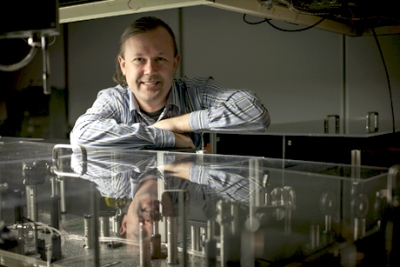Sep 23 2013
Poul Petersen’s excitement appears to be hard to contain when he talks about the proton transfer research he’ll undertake, thanks to his Beckman Young Investigator award.
 Poul Petersen in his lab in Baker Laboratory. Credit: Jason Koski/University Photography
Poul Petersen in his lab in Baker Laboratory. Credit: Jason Koski/University Photography
The award, given by the Arnold and Mabel Beckman Foundation, provides “research support to the most promising young faculty members in the early stages of academic careers in the chemical and life sciences, particularly to foster the invention of methods, instruments and materials that will open up new avenues of research in science.” Petersen, assistant professor of chemistry and chemical biology, is one of seven researchers honored this year with the award.
Petersen will use the funds as he studies how protons transfer either in media like water or from one molecule to another as in DNA. While there are many theories about how this happens, there haven’t been experiments to actually “see” the transfer happening, Petersen said.
“We are investigating the fundamental energy transfer processes of life,” Petersen said about the proton transfer experiments, which could have applications in disease prevention or treatment, as well as fuel cell development and other energy sectors.
Petersen’s technique uses ultrafast continuum infrared spectroscopy to probe changes about the entire vibrational spectrum using a single laser shot. The technique allows researchers to directly track the location of protons through the vibrations of bonds that break and form during the reaction, Petersen said.
The experiments require a new infrared array detector, a piece of equipment costing about $100,000. The $750,000 Beckman award provides funding for this vital piece, as well as salaries for graduate students who will be conducting research during the four-year period of the award.
In addition to these experiments, Petersen said the technique will be useful in investigating charge transfer and “traps” where electrons tend to get stuck when they are moving in nanocrystalline materials.
At Cornell since 2009, Petersen grew up in Denmark and fell in love with lab research during a summer working at Aarhus University, Denmark. He received his Ph.D. from the University of California, Berkeley, and did postdoctoral work at the Massachusetts Institute of Technology.
“I always felt like in class labs, we were just following a recipe created by the professor, but during the summer I was inventing my own recipes,” Petersen said about the importance of undergraduate research. His lab at Cornell includes six graduate students, one postdoctoral student and four undergraduates.
Along with the proton transfer experiments, Petersen’s lab studies dynamics and reactions on thin surfaces like a single molecular layer of water – experiments that can have both biological and atmospheric applications. The lab also does experiments related to electron transfer processes in nano-composite systems, which have alternative energy applications.